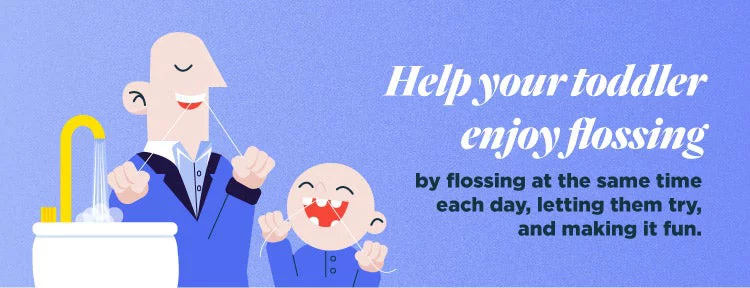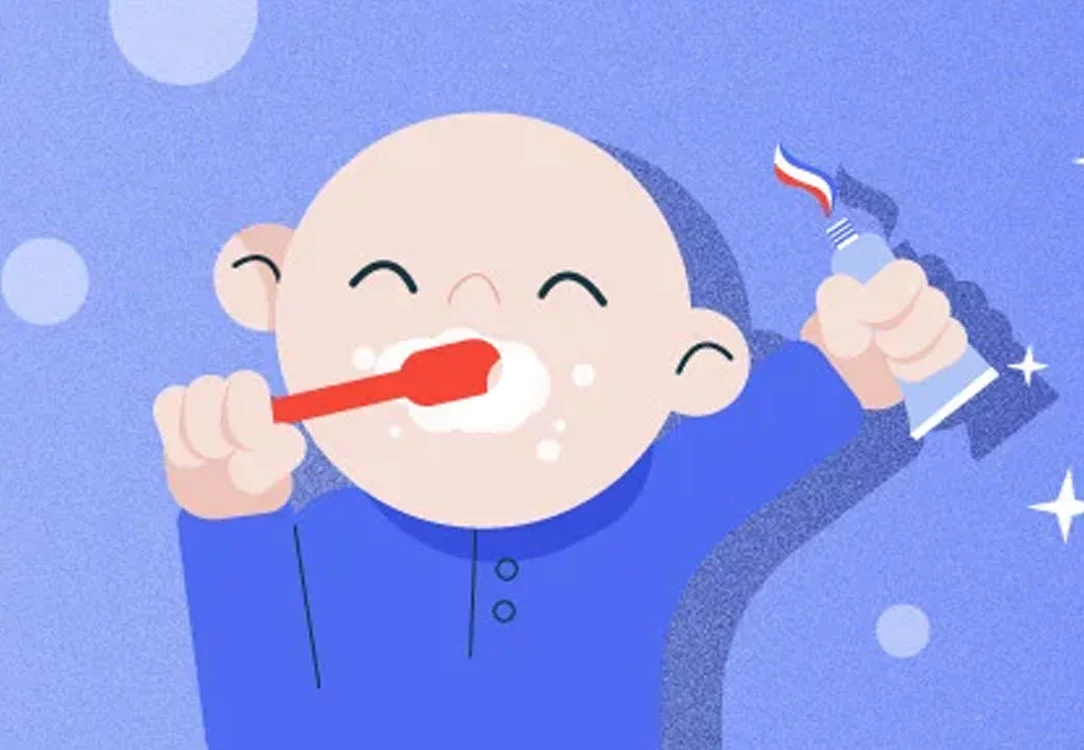Floss is able to slip in between teeth to clean out food that has become lodged, and it can even remove plaque from these hard-to-reach places between your teeth. Starting your child off with brushing in the morning and before bed is certainly a step in the right direction. Adding flossing once a day to your child’s daily routine not only helps protect your child’s mouth from potential cavities and destructive gum disease, but it also helps establish a good habit.
Why Is Flossing Kids’ Teeth Important?
Flossing teeth is important for everyone because removing plaque and bacteria along with food that is stuck between teeth will keep teeth healthy and clean, as well as keep breath smelling fresh.
What's the Best Way to Floss Kids’ Teeth?
Tips for Flossing Toddler's Teeth

- Do it at the same time every day, so your toddler knows what to expect.
- Always be gentle. Flossing should never be painful.
- Have a special toy for your toddler to hold or play with after they floss.
- Sing a song to your toddler while you floss their teeth. This will help them know how long they have to stand still while you floss their teeth.
- Use dental floss picks for easier maneuvering and a faster flossing session
- Let your toddler try to use the floss picks first, so they feel like they are getting to participate.
Do Kids Need Special Floss?
While a special floss isn’t necessary for your children to successfully clean between their teeth, learning how to use traditional floss in a spool can be difficult for young children. Parents should always assist very young children while flossing. While there are brands that cater to children, you don't need a specific toddler floss or baby floss as your child grows. Though using dental floss picks may be a more kid-friendly type of floss that can help encourage your kids to keep flossing every day. But when it comes to cleaning in between teeth, any type of floss will get the job done. Different types of floss to consider are:
- Waxed or unwaxed floss: The wax prevents the floss from breaking easily, but it can also make it difficult to fit through tight spaces.
- Super floss: A heavy-duty floss made to use around braces and other oral appliances.
- Floss picks, also called flossers: May make it easier for a parent to floss their child’s teeth. Also, it has a thin plastic handle that can be a good buffer in case your toddler decides to bite down.
- Flavored floss: If you have a child who is easily discouraged by new flavors, getting unflavored floss may be a better choice.
Best Kids Flossers
- EcoFrenzy
- Crayola
- GumChucks
When Should Kids Start Flossing?

Knowing when to start flossing your children's teeth may be the next question on your mind. Though keeping your toddler calm and still so you can brush their teeth may seem difficult enough, the American Dental Association recommends that you start flossing your toddler’s teeth when they have at least two teeth that touch one another. For many babies, flossing will start soon after they get their second tooth if the teeth are close together. At what age should a child start flossing on their own depends on the child, but many children are not capable of doing a thorough job until they are about ten years old.
How Often Should Kids Floss Their Teeth?
Find A Dentist In Your Community
To keep your child’s teeth healthy, brushing twice a day and making sure to floss at least once a day is essential. Having your child’s teeth looked over by a dentist every six months is also important to maintaining a healthy mouth. To find a kid-friendly dentist in your area, use Smile Generation’s Find a Dentist tool to find the right dentist for your family.
Find your trusted, local dentist today!
Sources
Smile Generation blog articles are reviewed by a licensed dental professional before publishing. However, we present this information for educational purposes only with the intent to promote readers’ understanding of oral health and oral healthcare treatment options and technology. We do not intend for our blog content to substitute for professional dental care and clinical advice, diagnosis, or treatment planning provided by a licensed dental professional. Smile Generation always recommends seeking the advice of a dentist, physician, or other licensed healthcare professional for a dental or medical condition or treatment.








